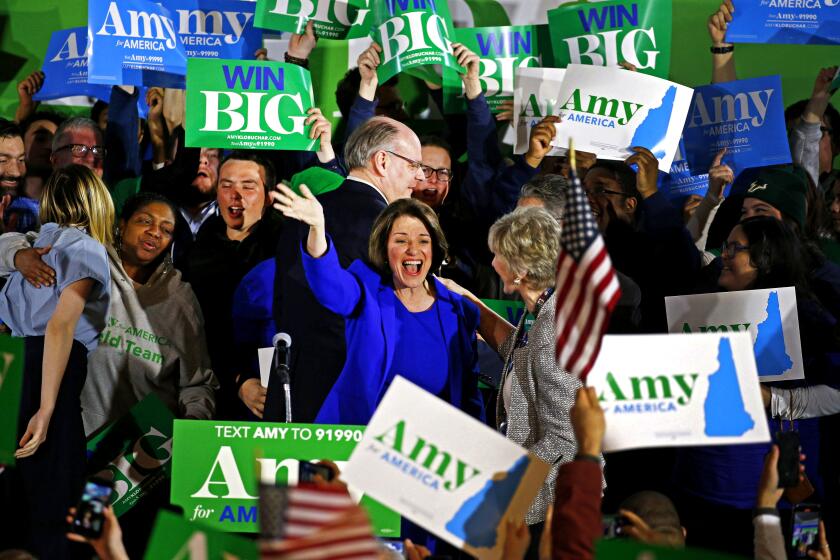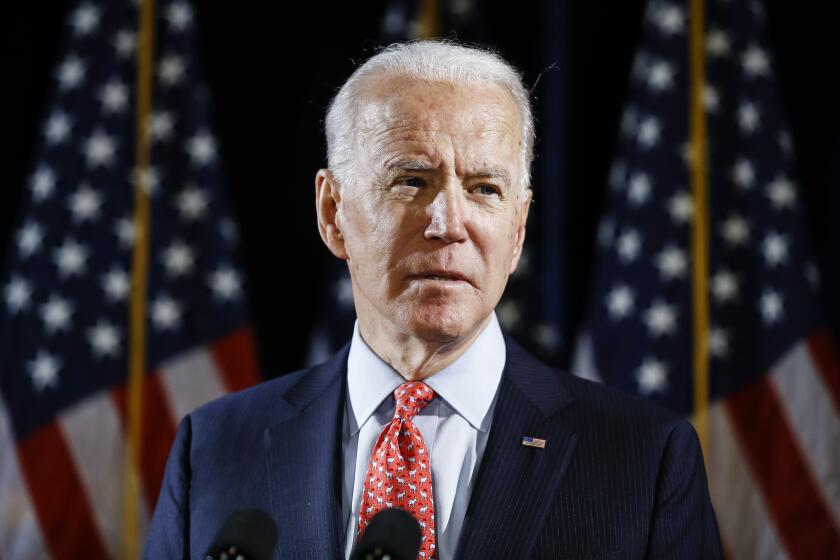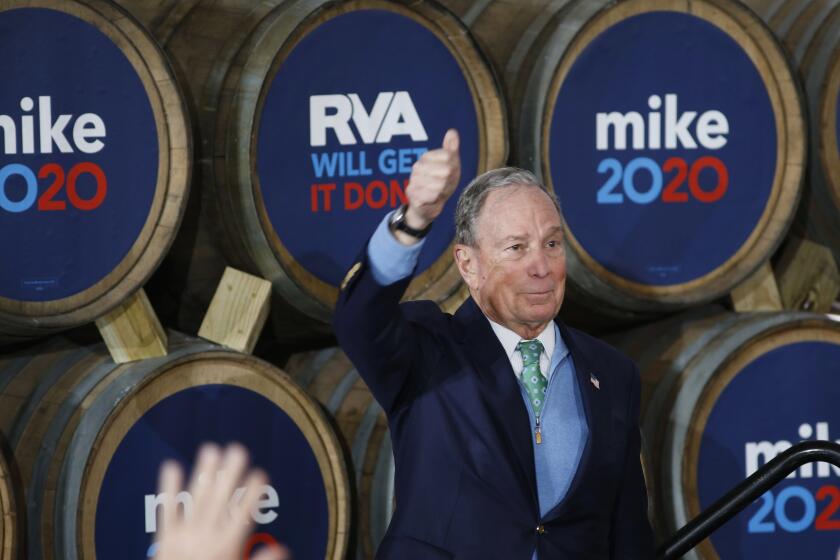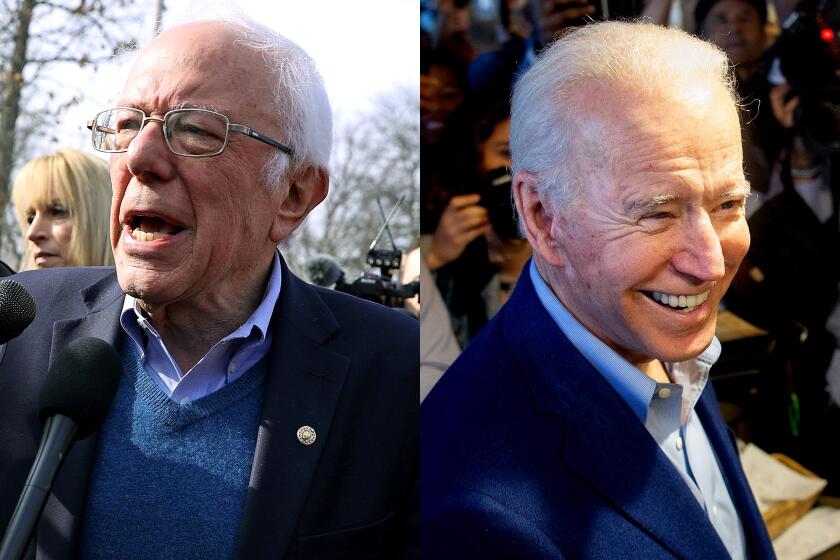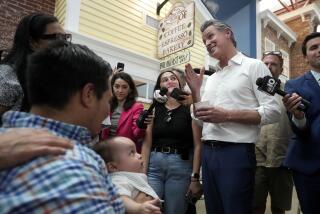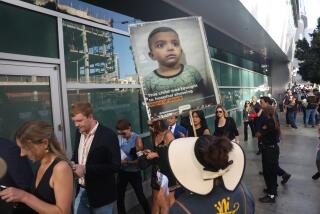Bernie Sanders and Michael Bloomberg’s attacks turn sharper, online and at Bay Area rally
- Share via
RICHMOND, Calif. — Tensions between Bernie Sanders and Michael R. Bloomberg took on a nasty edge Monday as each sought to establish a dominant position in the race for the Democratic presidential nomination.
Sanders continued his attacks at a rally in the Bay Area. After denouncing Bloomberg’s “racist” policy of having New York police stop and frisk young minority men, he told the exuberant crowd in Richmond: “Imagine a multibillionaire opposing a raise in the minimum wage. Imagine a multibillionaire asking for cuts to Social Security, Medicare and Medicaid.”
Sanders, the favorite candidate of progressive Democrats, has sought to highlight Bloomberg’s status as one of America’s richest men as he denounces what he sees as a corrupt political system that favors the wealthy and the corporate elite.
He also has sought to undercut Bloomberg, a former Republican, by reminding Democrats of the more conservative stands he took during his 12 years as New York mayor. On Monday afternoon, Sanders tweeted a photo of Bloomberg with Trump on a golf outing.
Bloomberg now supports an increase in the federal minimum wage, as well as a rise in Social Security benefits pegged to inflation and an expansion of healthcare services covered by Medicare and Medicaid.
His advisors denounced a series of tweets by Sanders advisors calling Bloomberg a racist authoritarian oligarch over the last couple weeks. “In the face of the most consequential election of our lifetimes, it is unfortunate that we are even talking about such slanderous attacks from other Democrats,” Bloomberg’s campaign said in a statement.
Bloomberg also released a video featuring vulgar online attacks by Sanders supporters, described as “Bernie Bros,” targeting critics of the Vermont senator. The former New York mayor also took exception to Sanders’ statement that Bloomberg could not create the excitement and energy needed to oust President Trump.
“We need to unite to defeat Trump in November,” Bloomberg wrote in a tweet linking to the video. “This type of ‘energy’ is not going to get us there.”
David Sirota, a senior Sanders communications advisor, wrote on Twitter that Bloomberg’s shots at Sanders “can be best understood as the enraged temper tantrum of a billionaire who has up until now been able to buy everything he wants — but who is now worried he may not be able to buy the presidency, and so he’s lashing out in an effort to silence critics.”
At the rally in Richmond, held in a pavilion that was once a Ford assembly plant, Sanders lashed back.
“Mr. Bloomberg, like anybody else, has a right to run for president,” Sanders said. “He does not have a right to buy the presidency.”
Sanders’ message went over well with supporters in the working-class city where the median household income is about $65,000, according to U.S. census data, and the majority of residents are black or Latino.
“I would not vote for Bloomberg,” said Clarissa Katko, a student at Diablo Valley College. “I’m tired of the Democratic Party compromising their ideals just for the sake of appearing moderate. It’s not helping the climate. It’s not helping students. It’s not helping minorities or LGBTQ people.”
The 45,000-square-foot Craneway Pavilion overflowed for the get-out-the-vote rally ahead of California’s March 3 primary and following Sanders’ win in last week’s New Hampshire primary. Chants of “I believe that we can win” and “Si, se puede” filled the pavilion.
Sanders, Buttigieg and Klobuchar take the top three spots in New Hampshire, while Elizabeth Warren and Joe Biden finish in single digits.
California is likely to be particularly friendly territory for Sanders when the votes are counted, given its diverse and liberal electorate; he is especially popular with Latinos and young people. He urged supporters who are independents to register as Democrats or ask for a Democratic ballot.
“This is the most consequential election in our history … and on Super Tuesday, California is voting,” Sanders said. “And I don’t have to tell any of you, you are the largest state in this country. You have the most delegates in the Democratic National Convention. And the candidate who wins here in California stands a pretty good chance of [becoming] the president of the nation.”
Razvan Mihalache, a student at Diablo Valley College who will be voting for the first time in a presidential election, said Sanders had the “most consistent record” of any of the candidates. “He’s actually the candidate who’s going to fight for this stuff, whereas other candidates are lukewarm on it and are going to back off of these policies.”
John Myles, a lifetime Richmond resident, said the crowd was not an accurate reflection of the largely black and Latino population of his hometown. But he said it was “huge” that the campaign held the rally at the plant that once employed many of the families in the city.
The field is down to Joe Biden now that Bernie Sanders ended his presidential campaign. Here is the Democrat heading for a battle with President Trump.
“It exemplifies that he’s the candidate that actually is promoting the working class,” said Myles, whose grandparents worked at the plant where in the 1940s Ford assembled military vehicles down the street from the rally. Myles said he believed the nation often discounted and forgot about the working class. He also said he felt Sanders was the only real option for black voters.
“We always get the same kind of person that says, well, let me be president and I’ll give you more status quo BS,” he said.
Sanders’ appearance in California, instead of in Nevada, where the race’s next contest is to be held on Saturday, appears to be part of a farther-looking bid to boost support in the more delegate-rich states that hold in-person voting March 3. His other appearances have included stops in North Carolina, Texas and Colorado.
Michael Bloomberg’s spending and rise in polls have made the billionaire a target of attacks by rival candidates, notably Bernie Sanders.
Bloomberg, who entered the presidential race late and skipped the four early-voting states, is making his first real stand in Super Tuesday contests on March 3. He has spent more than $124 million on television and radio ads in the 14 states that hold primaries that day and millions more on ground operations.
Bhuiyan reported from Richmond and Finnegan from Los Angeles. Times staff writer Matt Pearce in Las Vegas contributed to this report.
Here are key dates and events on the the 2020 presidential election calendar, including dates of debates, caucuses, primaries and conventions.
More to Read
Get the L.A. Times Politics newsletter
Deeply reported insights into legislation, politics and policy from Sacramento, Washington and beyond. In your inbox twice per week.
You may occasionally receive promotional content from the Los Angeles Times.
